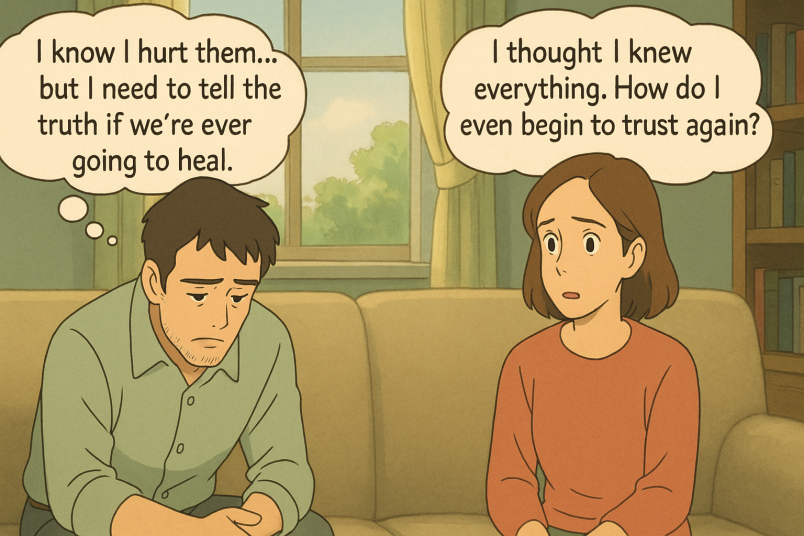7 Things to Keep in Mind While Recovering From Infidelity

Heal & Grow Daily for a Happier Relationship
Subscribe FREEKey Takeaways
Marriage.com AI Quick Summary
It hurts in ways you didn’t expect, doesn’t it?
One moment, things felt solid—or at least familiar—and the next, everything shifted. There’s confusion, a hollow ache, and a million questions crowding your mind… even the ones you wish you weren’t asking.
“Was it me?” “Will I ever feel normal again?”
Some days feel manageable; others feel like starting over from scratch. And then there’s the silence between you—or within you—that says more than words ever could.
Recovering from infidelity isn’t just about the relationship; it’s about the stories you tell yourself, the strength you didn’t know you had and the space you need to breathe.
It’s okay to pause, to cry, to not know. You’re not alone in this, even if it feels that way right now.
What does recovery from infidelity involve?
Recovery isn’t a straight line—it’s a loop, a wave, sometimes a full-on spiral. One day, you’re calm, the next you’re angry or deeply sad, wondering if anything will ever feel the same again. And that’s okay.
Recovering from infidelity in marriage or a relationship means sitting with those uncomfortable feelings, giving them room, and letting them shift over time. It’s about more than forgiveness or decisions—it’s about finding your footing again.
Research shows individuals can heal and even grow after infidelity, with forgiveness playing a key role. Differentiation supports forgiveness, but forgiveness alone significantly predicts posttraumatic growth in affected relationships.
Some moments might feel heavy, others lighter… but healing has a rhythm. You don’t have to rush it. You just have to keep showing up for yourself.
7 things to keep in mind while healing from infidelity
Healing after betrayal isn’t just about time—it’s about what you do with it. Some days, you might feel strong and steady; others, you may barely make it out of bed. And you should know that it’s completely fine to feel this way.
Recovering from infidelity isn’t a checklist—it’s a personal, emotional journey that takes patience, self-compassion, and honest reflection. Whether you’re staying, leaving, or still unsure, here are 7 gentle truths to hold onto along the way.
1. You’re allowed to feel everything
There’s no “right” emotion to have after betrayal. Anger, grief, numbness, and confusion—they all belong. Some days, you might cry at random moments; other days, you might feel oddly detached, like it didn’t really happen.
Recovering from infidelity means honoring your emotional truth, even when it doesn’t make sense to anyone else. You don’t have to explain your feelings. Just let them be. Suppressing them only makes healing harder. Feel it all—even the stuff you wish you didn’t.
-
If you feel stuck…
Try naming your emotions out loud or writing them in a private journal each day. Don’t filter. Use words like “I feel…” and “I need…” to connect with what’s really going on. Sometimes, naming the feeling is the first step to moving through it.
2. Don’t rush big decisions
In the early days, everything feels urgent. “Should I stay?” “Should I go?” But here’s the thing—clarity takes time. You don’t have to decide right now. You’re still swimming through a sea of emotions; making big life choices in this state can leave you feeling more lost.
Recovering after infidelity involves giving yourself space to breathe, reflect, and gather strength. Let the fog settle a bit. You’ll know more later—about yourself, your partner, and your path forward.
-
If you feel stuck…
Set a “pause period” of 30 days where you agree not to make permanent decisions. Use that time to reflect, journal, rest, and observe without pressure or urgency.
3. It wasn’t your fault
Infidelity is a choice—a painful, damaging one—but it’s not a reflection of your worth. You might be picking apart every moment, wondering what you missed or where you “failed.” Please don’t. People cheat for all sorts of reasons, but none of them justify the betrayal.
Recovering from infidelity means untangling your self-esteem from someone else’s choices. You didn’t “deserve” this. No one does. Your job now isn’t to carry blame—it’s to start reclaiming your peace.
-
If you feel stuck…
Write down three truths about yourself that have nothing to do with the betrayal. Read them aloud daily. Then, repeat this phrase: “I didn’t cause their choice.”
4. Rebuilding trust takes time
Even if you choose to stay, trust won’t magically return. It’s broken now—and that’s real. But broken doesn’t mean destroyed forever. It means slow steps, clear honesty, and consistency over time. You’ll need to see—not just hear—accountability.
You might question things often… that’s part of recovering from infidelity. If you’re both committed, trust can be rebuilt—but it won’t look like before. It’ll be new, different, and hopefully more honest than ever before.
-
If you feel stuck…
Create a trust-building plan together with small, specific actions: check-ins, open phone access, or weekly talks. These steps give structure to an otherwise messy process.
5. Both partners must do the work
If you’re wondering how to recover a marriage after infidelity, know this: it takes two. One partner can’t carry the healing on their own. The person who cheated must show real remorse, not just regret. That means answering hard questions, rebuilding safety, and respecting boundaries.
And if they’re not willing?
That says something, too. Healing isn’t about dragging someone to change; it’s about seeing if they’re willing to rise and repair what they broke—with actions, not just words.
-
If you feel stuck…
Ask them for three specific changes they’re willing to make, then assess how they follow through. If the energy is one-sided, notice that—don’t ignore it.
6. You might need outside help
Talking to someone who won’t judge you—who truly gets it—can be a lifeline. Whether it’s a therapist, counselor, or even a support group, professional help can offer clarity you just can’t find on your own.
Recovering from infidelity isn’t something you have to do solo. Sometimes, the pain is too tangled to sort through by yourself. And that’s okay. Reaching out isn’t weakness—it’s wisdom. Healing is hard enough; don’t try to carry it all alone.
-
If you feel stuck…
Search for therapists who specialize in betrayal trauma or infidelity recovery. Can’t afford one? Try free support groups online, podcasts, or anonymous forums to start.
7. It’s okay to let go
Not all relationships survive infidelity, and choosing to leave doesn’t mean you gave up. Sometimes, walking away is the bravest, healthiest thing you can do. Maybe you tried, maybe they didn’t, or maybe it’s just too broken.
Letting go doesn’t erase the love you had—it honors the love you now have for yourself. Recovering from infidelity means listening to your inner voice, even when it whispers something scary. Trust it. You’re allowed to choose peace.
-
If you feel stuck…
Make a list titled “What I’m leaving behind vs. what I’m making space for.” Use it to remind yourself that letting go isn’t loss—it’s redirection.
Can a relationship survive after infidelity?
Some couples do make it—slowly, painfully, and with intention. But surviving infidelity isn’t just about staying together; it’s about changing how the relationship works.
It means facing hard truths, rebuilding broken foundations, and creating new, healthier patterns. Not every couple can—or should—continue, but when they do, these 5 pieces matter deeply.
-
Real accountability has to show up
There’s no moving forward without the person who cheated taking full ownership. That means honesty, not excuses—no “but you weren’t meeting my needs” or deflection.
True accountability shows up in actions: answering questions, offering transparency, and being patient. If they can’t sit with your pain, healing becomes harder. This step isn’t optional—it’s the ground on which everything else stands.
- Notice this: Accountability looks like consistency, not grand gestures. If they say “I’m sorry” but keep hiding things, pay attention. Genuine repair doesn’t just sound right—it feels steady, even in the hard moments.
-
Both people must feel emotionally safe
Emotional safety is the quiet thing that makes repair possible. You need to feel heard, not judged, validated, not dismissed. The betrayed partner must be able to express pain without being shut down.
The betraying partner also needs space to face their shame and guilt. Without safety on both sides, walls stay up, and real connection stays out.
- Notice this: If you’re walking on eggshells or bracing for blame, safety isn’t there yet. Look for conversations that feel calmer, more open, and less defensive—even if they’re difficult.
-
The relationship itself needs to evolve
You can’t return to “how things used to be”—that version of the relationship broke. Surviving infidelity means creating something new. That might mean shifting communication styles, resetting boundaries, or redefining emotional needs.
It’s not about pretending nothing happened; it’s about building something wiser, stronger, and more intentional. The old rules don’t work anymore—you get to write new ones.
- Notice this: Growth feels uncomfortable at first. If things start to change—how you talk, what you ask for, what you allow—it’s not regression. It’s the messy middle of becoming something better.
-
Time, space, and patience are non-negotiable
This won’t heal in a month. There will be relapses of trust, tears on ordinary days, and moments when it feels like nothing is working. That’s normal.
Both partners need to offer time without pressure or rushing and create space for individual healing. Patience doesn’t mean avoidance; it means allowing room for grief, rebuilding, and eventually… renewal.
- Notice this: If someone keeps asking, “Aren’t you over it yet?”—that’s a red flag. Recovery has no deadline. It’s okay to need more time, more talking, and more reassurance. That doesn’t mean you’re weak.
Watch this TED Talk in which relationship therapist Esther Perel explores why people cheat and why it hurts so deeply. She offers a fresh, thought-provoking lens on infidelity, not just as a betrayal but as an expression of longing and loss:
-
Some couples come out stronger
It’s rare, but it happens. When both partners dive deep, address root causes, and commit to real change, something surprising can happen: intimacy grows.
Not the old kind—the deeper, scar-touched kind that comes from vulnerability and honesty. The betrayal doesn’t disappear, but it becomes part of your story, not the end of it. And sometimes… that’s enough to begin again.
- Notice this: Strength after betrayal doesn’t look perfect—it looks tender, resilient, and sometimes still afraid. But if you feel emotionally closer, more honest, and safer than before… you might just be healing together.
Hope, healing, and moving forward
Healing after betrayal isn’t something you rush—it’s something you live through, one small, brave step at a time. Some days will feel heavy, others will be surprisingly okay, and both are part of the process.
Whether you stay or go, whether you forgive or just learn to breathe again, you’re doing something incredibly hard—and that deserves grace. You don’t need to have it all figured out today.
Just honor what you feel, take care of your heart, and remember: recovering from infidelity doesn’t mean forgetting what happened; it means choosing how you want to move forward from here—with honesty, care, and courage.
Stuck in conflict and unsure how to move forward together?
 Expert Q&A
Expert Q&A
My husband cheated on me with around 80 women in one-night stands over the course of 7 years. How can I forgive him?


Jennifer Jacobsen Schulz
Licensed Clinical Social Worker
Expert Answer
Forgiving such behavior can be challenging. He will need to commit to repairing the relationship, changing his behavior, and rebuilding trust. He also needs to take accountability and show remorse for this behavior. These things must happen for you to be able to rebuild trust and forgive. Ultimately, you'll have to decide whether to forgive this. For many, this would be an unforgivable offense. However, you might also decide that you love him and the life you've built. This could be motivation for forgiveness. That being said, this type of situation can be incredibly difficult to forgive, and I'd highly recommend sitting down with a couple's counselor. At the very least, you would benefit from talking with a counselor to process your feelings and decide how to proceed. At the end of the day, you deserve better than someone who has 80 affairs. It might be worth exploring why you'd like to remain with someone who violates your trust so deeply.
I'm a 67-year-old woman, and my husband (60M) cheated on me with another man for sex. How can I trust that he won’t do it again? How do we heal our marriage?


Jennifer Jacobsen Schulz
Licensed Clinical Social Worker
Expert Answer
Moving on from an affair is possible. It will require both partners to be committed to repairing the relationship. This will require open communication, but he will need to accept that he needs to regain your trust. These issues are often best managed with the assistance of a marital counselor.
 Tips
Tips
Write your tip or submit a video tip
All tips are reviewed before the publishing.
Share this article on
Related Articles
Recent Articles
Related Quizzes
Heal & Grow Daily for a Happier, Healthier Relationship
Subscribe FREE on YouTube We'd love your feedback!
We'd love your feedback!
 Expert Q&A
Expert Q&A
Ask your question related to this topic & get the support you deserve from experts.


 Reviewed by
Reviewed by
 Thanks! We'll do our best to answer your question and post it above.
Thanks! We'll do our best to answer your question and post it above.















